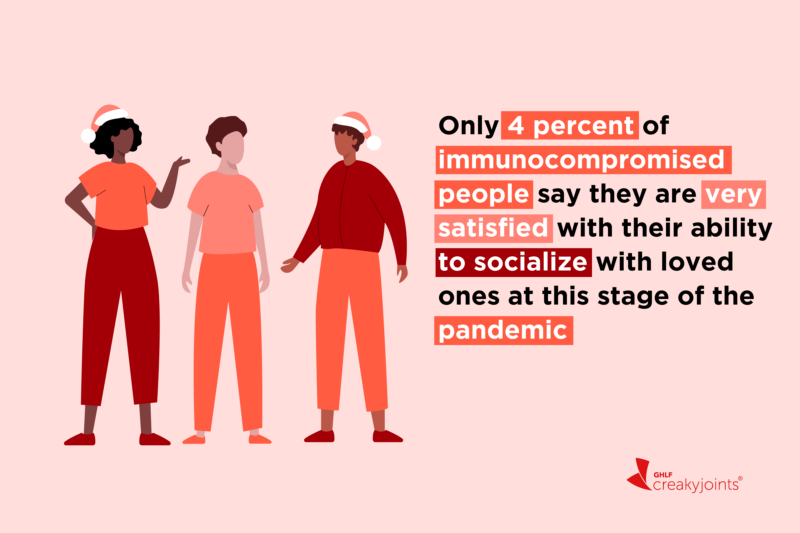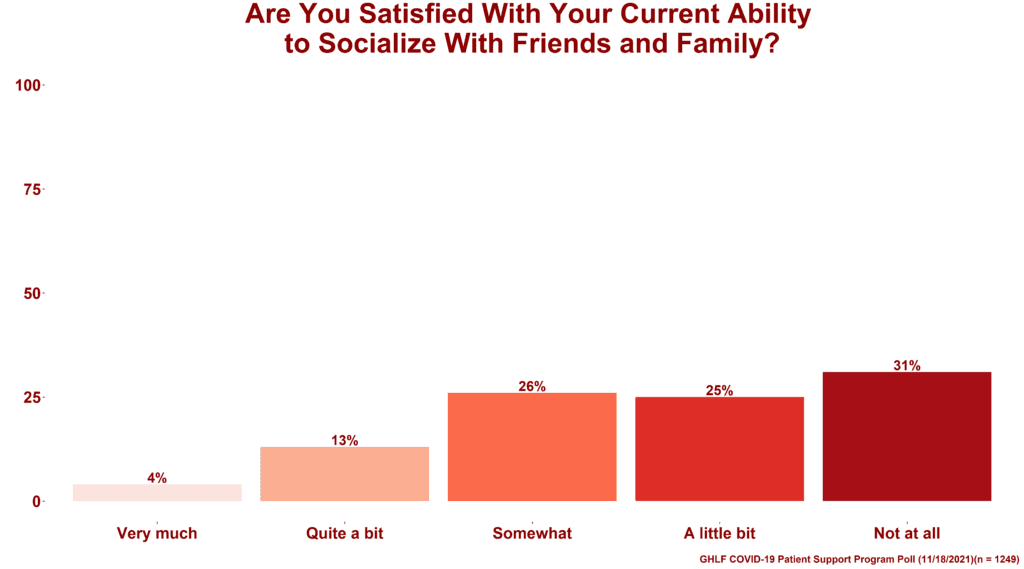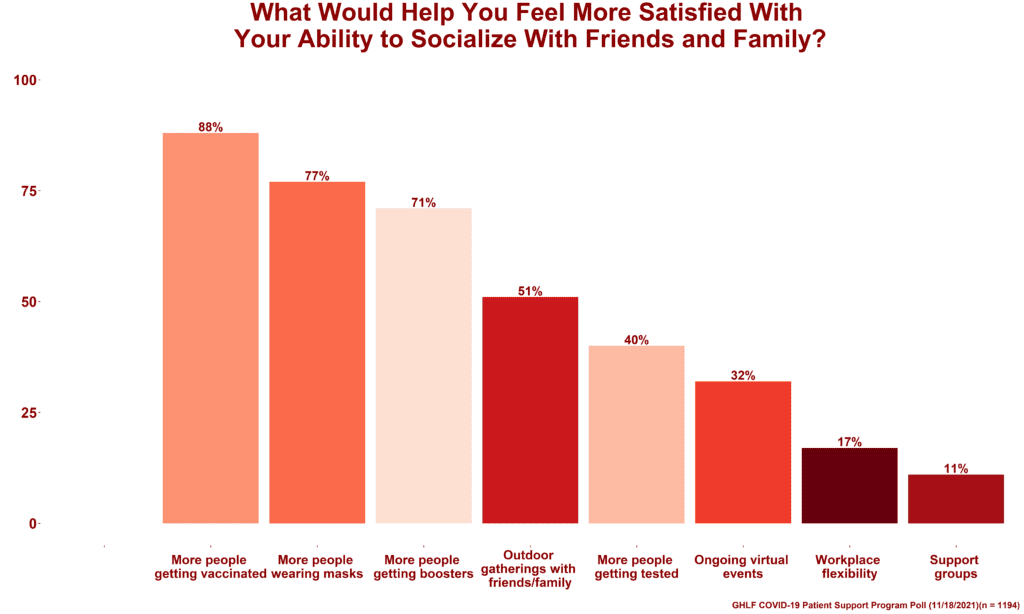Learn more about our FREE COVID-19 Patient Support Program for chronic illness patients and their loved ones.
Just recently, the U.S. Centers for Disease Control and Prevention (CDC) recommended a booster shot of the COVID-19 vaccine for all adults. This news comes amid concerns about rising infections during this period of holiday travel, cold weather driving people indoors, and unknowns about the impact of the Omicron variant.
Unlike last year’s holiday season when we were on the cusp of getting emergency use authorization for a COVID-19 vaccine, this year we have the vaccine for everyone ages 5 and up, and boosters for adults to boot. With this additional layer of protection (not to mention, plenty of pandemic fatigue), many people are gathering and celebrating with their loved ones. Holiday travel is up and back to pre-pandemic levels. The Sunday after Thanksgiving was the busiest day for domestic air travel since the beginning of the pandemic.
But this isn’t the case for everyone.
There are many reasons high-risk and immunocompromised people feel they can’t get back to “normal” when it comes to gathering and socializing. First, studies show that people who are immunocompromised because of inflammatory and autoimmune conditions may have a higher risk of complications and hospitalizations from COVID-19. Second, people who are immunocompromised and take certain immunosuppressant medication may not garner a full immune response to the vaccine.
This means that they may still be vulnerable to COVID-19, and therefore must keep taking precautions to protect themselves from the virus. This includes wearing a mask, avoiding crowded areas, and in some cases, making tough decisions about spending time with others.
In our latest poll, the Global Healthy Living Foundation’s COVID-19 Patient Support Program aimed to gain more insight into how its immunocompromised and high-risk community members feel about socializing with others and what factors would make them feel more comfortable doing so.
Of the 1,249 survey respondents (98 percent reported being fully vaccinated), only 4 percent are very much satisfied with their ability to socialize. The majority were not satisfied and feel that more basic COVID-19 safety precautions would help.
Here are some other key learning and insights from the poll.
Most immunocompromised people are not satisfied with their ability to socialize with others
As part of the poll, patients were asked if they are satisfied with their current ability to socialize with friends and family at this stage of the pandemic. According to the results:
- 56% are not at all or a little bit satisfied
- 26% are somewhat satisfied
- 18% are quite a bit or very much satisfied
There are many reasons for peoples’ discomfort with socializing
We asked respondents why they are not satisfied with the ability to socialize with family and friends. They were given six options and able to select all options that applied.
- 80% are not comfortable socializing in large groups (10 or more people)
- 54% are not comfortable socializing with people outside of their household
- 31% are not comfortable socializing with unvaccinated people
- 26% are not comfortable socializing with vaccinated people who have unvaccinated children
- 25% are not comfortable socializing with vaccinated people who haven’t had a booster shot
- 13% are not comfortable socializing when others aren’t masked
In a free response section where people could elaborate on their concerns about socializing, fear and lack of trust were common themes.
“I feel anxious because I have no idea how much protection any of the COVID vaccines gave me,” one person shared. Another agreed, saying “Until more is known about COVID, I remain extremely cautious.”
Another person wrote, “I don’t know what a breakthrough disease could do to me.”
Many expressed concerns about trusting those around them. “I’m not comfortable when I don’t know someone’s vaccine status,” one respondent said, while someone else shared, “I don’t know if I can trust people to tell me the truth.”
Unsurprisingly, basic COVID-19 safety precautions and vaccination would help people feel more comfortable
Many immunocompromised and high-risk people have continued to be cautious throughout the pandemic, even as many others resumed pre-pandemic habits. This has meant staying home, avoiding large gatherings, regular COVID-19 testing, and wearing a mask outside of the home.
When it comes to socializing, our poll results show that immunocompromised patients would feel more comfortable if others were taking these precautions as well. In the survey we asked participants what scenarios would help them feel more comfortable with socializing.
The most important aspect to respondents was vaccine status: 88 percent would feel more satisfied if more people were getting vaccinated against COVID-19, and 71 percent would feel more satisfied if more people got booster shots. Second to vaccine status, masking is important, with 77 percent reporting they would feel more comfortable with more people were wearing masks.
Other factors that would help people feel more satisfied with their ability to socialize:
- 51% said outdoor gatherings with family and friends
- 40% said more people getting tested for COVID-19
- 32% said ongoing virtual events
- 17% said workplace flexibility
- 11% said support groups
In write-in responses, immunocompromised patients said they find it hard that others aren’t taking COVID-19 seriously because of a lack of public understanding of the reality in which immunocompromised people live.
“There needs to be clearer public messaging about COVID risks for immune compromised people. Most people speak of the pandemic in the past tense, and they don’t realize that immune-compromised people are still challenged every day by COVID. Our lives are not back to normal. We still need to take precautions: masking, distancing, and being careful of exposure in indoor settings,” one person wrote.
Another person echoed these thoughts by emphasizing that, “more people understanding [that] COVID isn’t a game” would help them feel more comfortable.
Many respondents shared how more tailored information could help themselves and others understand more and feel more comfortable. “I feel as though there is not enough information in the media or from the CDC [regarding] the immunocompromised and we get ignored a lot,” one person wrote. And another person shared they would feel more comfortable if there was “more widespread understanding of and respect for immunocompromised peoples’ COVID-related protection needs.”
The Global Healthy Living Foundation is committed to providing ongoing education about COVID-19 vaccines for the chronic illness and immunocompromised community.
To stay informed about the latest COVID-19 vaccine news for people who are immunocompromised, take immunosuppressant medications, or have autoimmune conditions, follow all of our COVID-19 vaccine coverage here.
Get Free Coronavirus Support for Chronic Illness Patients
Join the Global Healthy Living Foundation’s free COVID-19 Support Program for chronic illness patients and their families. We will be providing updated information, community support, and other resources tailored specifically to your health and safety.
About the Patient Support Program Quick Poll
Members of our program have underlying health issues — such as inflammatory arthritis and other autoimmune conditions, heart disease, lung disease, diabetes, and more — that may increase their risk for COVID-19 complications. They are interested in understanding the best ways to stay safe during the pandemic and to be part of a community of people with similar concerns, questions, and fears.
We regularly poll members, who live in the U.S. as well as around the globe, about a variety of topics, including how the pandemic is affecting their lifestyle, mental health, chronic disease management, medication adherence, and more.
We use this information to inform the educational resources we provide and to inform other stakeholders — such as public health experts, policymakers, advocacy groups, health care professionals, and pharmaceutical companies — about chronic illness patients’ needs and concerns. You can participate in ongoing polls by joining the support program here.








